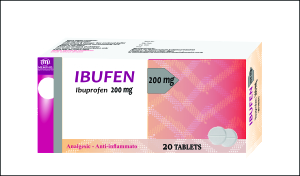Ibuprofen Composition: IBUFEN 200MG TABLET: Each tablet contains: Active ingredient: Ibuprofen 200 mg IBUFEN 400MG TABLET: Each tablet contains: Active ingredient: Ibuprofen 400 mg Inactive Ingredients: IBUFEN 200MG TABLET: Microcrystalline cellulose (Avicel PH 102), Croscarmellose sodium (Ac-di-sol), Lactose monohydrate, , Talc, magnesium stearate, Colloidal silicon dioxide (Aerosil 200). IBUFEN 400MG TABLET: Microcrystalline cellulose (Avicel PH 102), Croscarmellose sodium (Ac-di-sol), talc, Lactose monohydrate, , Talc, magnesium stearate, Colloidal silicon dioxide (Aerosil 200). Pharmaceutical form: Tablets. IBUFEN 200MG TABLET: White round flat tablet scored from one side. Scoring is nonfunctional (not for dose division) to facilitate swallowing only, Take the whole table IBUFEN 400MG TABLET: White rounded biconvex uncoated tablet. Therapeutic indications: Symptomatic treatment of: Mild to moderate pain including migraine headache. Primary dysmenorrhoea. Fever. Symptomatic treatment of pain and inflammation in arthritic diseases (e.g. rheumatoid arthritis) degenerative arthritic conditions (e.g. osteoarthritis), and in painful swelling and inflammation after soft tissue injuries. Posology and method of administration: Undesirable effects may be minimized by using the lowest effective dose for the shortest duration necessary to control symptoms. The treating physician decides on the duration of treatment. In rheumatic diseases the use of IBUFEN can be required for a longer period. The ibuprofen dose depends on the patient's age and body weight. The maximum single dose for adults should not exceed 800 mg of ibuprofen. The tablet should be swallowed with a glass of water preferably after a meal. It is recommended, that patients with a sensitive stomach take ibuprofen during a meal. Mild to moderate pain and fever: *Adults and adolescents ≥ 40 kg body weight (12 years and above): 200-400 mg given as a single dose or 3-4 times a day with an interval of 6 hours as required. The dosage in migraine headache should be: 400 mg given as a single dose, if necessary 400 mg with intervals up to 6 hours. The maximum daily dose should not exceed 1200 mg. *Children ≥ 20 kg body weight (6-11 years): Children 20-29 kg (6-9 years): 200 mg 1-3 times a day with intervals of 6 hours as required. The maximum daily dose should not exceed 600 mg. Children 30-90 kg (10-11 years): 200 mg 1-4 times a day with intervals of 6 hours as required. The maximum daily dose should not exceed 800 mg. Ibuprofen is contraindicated in children below 20 kg body weight or younger than 6 years of age. Primary dysmenorrhea: Adults and adolescents ≥ 40 kg body weight (12 years of age and above): 200-400 mg 1-3 times a day, with an interval up to 6 hours, as needed. The maximum daily dose should not exceed 1200 mg. Rheumatic diseases: *Adults: The recommended dose is 1200-1800 mg daily in divided doses. Maintenance doses of 600 mg-1200 mg daily may be effective in some patients. In acute and severe conditions the dose may be (temporarily) increased to a maximum of 2400 mg in 3 or 4 divided doses. *Adolescents from 15 to 17 years of age: The recommended dose should be adjusted by weight: 20 mg/kg to a maximum of 40 mg/kg body weight daily (max 2400 mg daily) in 3 to 4 divided doses. Elderly: NSAIDs should be used with particular caution in elderly patients who are more prone to adverse events and are at increased risk of potentially fatal gastrointestinal haemorrhage, ulceration or perforation. If treatment is considered necessary, the lowest dose for the shortest duration necessary to control symptoms should be used. Treatment should be reviewed at regular intervals and discontinued if no benefit is seen or intolerance occurs. Impaired renal function: In patients with mild or moderate reduction of renal function, the dose should be kept as low as possible for the shortest duration necessary to control symptoms and renal function monitored. (For patients with severe renal failure see section contraindications) Impaired liver function: In patients with mild or moderate reduction of liver function the dose should be kept as low as possible for the shortest duration necessary to control symptoms and liver function monitored. (For patients with severe liver failure see section contraindications) Contraindications: IBUFEN is contraindicated in patients with: - Hypersensitivity to the active substance or to any of the excipients. - Previous hypersensitivity reactions (e.g. asthma, rhinitis, urticaria or angioedema) in response to acetylsalicylic acid or other NSAIDs. - History of gastrointestinal bleeding or perforation, related to previous NSAIDs therapy. - Active, or history of recurrent peptic ulcer/haemorrhage (two or more distinct episodes of proven ulceration or bleeding). - Severe renal failure or severe hepatic failure. - Severe heart failure (NYHA Class IV). - Last trimester of pregnancy. - Significant dehydration (caused by vomiting, diarrhoea or insufficient fluid intake). - Cerebrovascular or other active bleeding. - Unclarified blood-formation disturbances. - NSAIDs is contraindicated for the treatment of perioperative pain in the setting of coronary artery bypass graft (CABG) surgery Ibuprofen is contraindicated in children below 20 kg body weight or younger than 6 years of age. Special warnings and precautions for use: The use of IBUFEN with concomitant NSAIDs including cyclooxygenase-2 selective inhibitors should be avoided due to the increased risk of ulceration or bleeding. Undesirable effects may be minimized by using the lowest effective dose for the shortest duration necessary to control symptoms. Patients treated with NSAIDs long term should undergo regular medical supervision to monitor for adverse events. IBUFEN should only be administered under strict consideration of the benefit-risk ratio in the following conditions: - Systemic Lupus Erythematosus (SLE) or mixed connective tissue diseases. - Congenital disturbance of porphyrin metabolism (e.g. acute intermittent porphyria). - The first and second trimester of pregnancy. - Lactation. Special care has to be taken in the following cases: - Gastrointestinal diseases including chronic inflammatory intestinal disease (ulcerative colitis, Crohn's disease). - Cardiac insufficiency and hypertension. - Reduced renal function. - Hepatic dysfunction.
